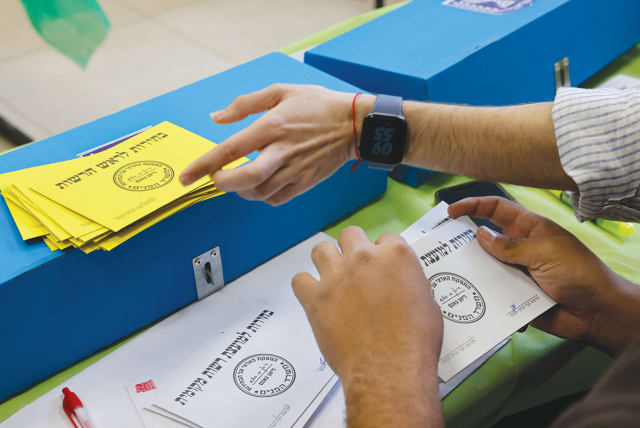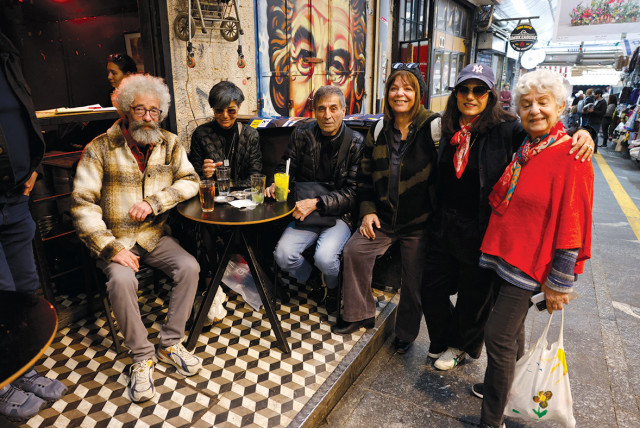Jerusalem municipal elections: Who won? What happens next?

Jerusalem barely turned out to the polls for the municipal elections. What happens next?

At press time, one thing was sure even before all the ballot boxes in the city were counted: Moshe Lion is at the helm for another five years. At half past midnight, he declared to his followers and supporters, gathered at the ICC, that before anything else, he prays for the safe return of the hostages, for the soldiers still on the front, and for the bereaved families.
“I am excited. I was privileged to be mayor for five years, and I started the revolution together with my friends. This revolution will get stronger and stronger, like a kind of booster. Jerusalem is bigger than any person and any event, and we will make it more loved, more interesting, more dynamic – and calmer. It will bloom.
“It will be not only the Holy City or just the capital city, not only the capital of the Jewish people. Jerusalem will also be Israel’s next thing. I want my coalition, with One Jerusalem at its center, to have many partners from all parts of the city, from all parts of the communities of the city.”
According to the initial ballot counting, the two largest lists on the new council will be Shas and Degel Hatorah. Lion hasn’t managed to break through, ending up with only two seats on the council.
With the fickle weather (cooling down and a bit of rain after a week of sunshine), the war, the interest rate that doesn’t go down, and the general gloomy atmosphere, it seemed on Tuesday this week that everything was drained into a lackluster and disappointing Election Day in terms of the participation figures.

Well, it was indeed so. At the time of this writing, about four hours before the closing of the polls, the official data indicate a drastic decrease in the number of participants – about 10% less than in the 2018 elections.
The turnout was so bad that President Isaac Herzog appealed to the citizens: “Go vote and make an impact. The local government affects our lives in a very dramatic way. If we really want to influence the direction of our lives, it is best to go out and vote in the elections for the local authorities.
“It has been proven on several occasions that in a war, in a state of emergency, we see the municipality and the local authority and council handling and facing a multitude of challenges, and nothing is more important than that.”
Unfortunately, at least by 6 p.m., Herzog’s message didn’t inspire too many Jerusalemites, who remained indifferent and far from the ballots.
Since 3 p.m., in an almost desperate attempt to encourage the public to go out and vote, the rate of recorded messages on the networks and phones of tens of thousands of residents, mainly from Lion but also from other candidates, increased greatly.
“Go vote” was the central motif in these calls. “For the sake of our city, for the future of our children, and for the sanctity of Jerusalem” were the messages that came from the multitude of ultra-Orthodox and religious factions.
The campaign in Jerusalem is being waged this time around the future composition of the city council. But indifference among the general public and the high voting percentages among the ultra-Orthodox public may prevent the fulfillment of the wish of many Jerusalemites, including the incumbent mayor, to reach a more balanced city council in terms of the representation of the various sectors.
The day of elections
In the well-heeled Baka neighborhood at 8 a.m. on Tuesday, everything is as usual; that is, there is no trace of the atmosphere of Election Day. The cafés are filling up, and the delis and greengrocers are displaying their wares without any indication of a special day.
In the city center, traffic is relatively light; a trip from Hebron Road to KKL Street takes just a few minutes, and there is no trace of the notorious traffic jams. At 10:10, near the famous steps of the Hebrew gymnasium, several photographers and journalists are gathering, waiting for Lion, accompanied by his wife, Stavit, to vote.
“Yes, of course, I voted for Moshe Lion,” the mayor tells us with a big smile, adding, “The elections are a great joy. The east of the city deserves a bigger budget for infrastructure and education; the city is clean; and Jerusalem is currently the safest city in the country. May it continue like this.”
Lion, dressed in one of his more elegant suits, matching the color of his wife’s luxurious attire, adds that we are all still in the trauma of Oct. 7, and he hopes that everything will go back to normal. In response to a reporter’s question about what Religious Zionism means to him, the same movement that reached the peak of division in these elections, Lion simply answers, “I am part of it.”
Lion could allow himself the liberty of joking around a little, given that the polls indicate support for him, as well as for his list, which will likely avoid the disgrace of 2018, when he was elected without any representation on the council.
It’s already 11:30 a.m. in the Bayit Vagan neighborhood, on Yosef Hachami Street. At a large polling station in the heart of a modern ultra-Orthodox area, young men in white shirts and tzizit are standing outside, offering flyers for the Noam Jerusalem list, led by Eldad Rabinowitz, a Silwan resident.
They seem particularly enthusiastic, turning with a smile to the women with baby carriages coming to the polls and encouraging me to go inside and vote for the sanctity of Jewish Jerusalem. A few meters away, covering the fence that hides a construction site on the same street, a huge sign includes a very large picture of the most intriguing candidate in these elections, Avishai Cohen.
Cohen, who has already broken a huge taboo by placing an ultra-Orthodox woman next to him on the list, is, in fact, a big headache for the ultra-Orthodox lists. A lively and energetic man, surrounded by a group of ultra-Orthodox youths who look up to him with no small amount of admiration, he radiates restrained self-confidence.
“I know there are many ultra-Orthodox, mainly Lithuanians and even Shasnikim (supporters of the ultra-Orthodox Shas party), who tell me quietly, in secret, that they will vote for me at the ballot box. I know that I represent the new direction of thousands of young ultra-Orthodox who want the change I represent.”
While talking to us, his assistants erected two more huge signs on the balcony of one of the apartments on the street – one with Cohen’s picture and the other with that of Malka Greenblatt, his partner in this endeavor.
And so, on a gloomy Election Day featuring a rather indifferent public, on a street in an ultra-Orthodox neighborhood (Bayit Vagan), a picture of a woman with a wig and modest clothing is brilliantly emblazoned, and there is little chance that some ultra-Orthodox shababnik (young haredi rebel) would dare to tear down the sign. So it can’t be said that nothing interesting was happening on this ultra-Orthodox street in Jerusalem in these elections.
“I arrived to vote here in Bayit Vagan, where I live. People recognized me, smiled at me, and told me that they are happy about my direction and that they support the revolution I am promoting, with God’s help,” Cohen saiy.
What is amusing is that both sides in the competition are loudly playing the same song, “We are believers, sons of believers,” a very popular tune among the traditional, religious public and even among some of the ultra-Orthodox.
Around the city
From there, Jerusalem Post photographer Marc Israel Sellem and I go to Herzl Boulevard, to the Ziv schools, where double candidate Yossi Havilio, who is running for mayor, as well as at the head of the Jerusalem Union list, is encouraging residents to vote for him.
The Beit Hakerem neighborhood is one of the strongholds of the secular public in the city, and here there is a bit more of an atmosphere of a special day. Both the elderly and young adults arrive to vote. Havilio is somewhat of a hero here. People approach him, are friendly to him, and remind him that they expect him to do a lot on the city council.
Havilio says he has a good feeling. “In all the secular neighborhoods, I have obtained very good feedback, but I am worried by the low number of people voting. We must find a way to get the people out to vote; this is the most important issue now.
“I tell everyone that this is a battle for the image of Jerusalem: Will Jerusalem be liberal, open, and egalitarian? Today, the ultra-Orthodox are the majority on the council, even though they are a third of the Jewish public; that is not right... I’m not against the ultra-orthodox, but if we don’t keep these young people in Jerusalem, we will lose the city we love.”
At Mahaneh Yehuda – usually the stronghold of politicians, mostly from the Right wing – it seems like a normal weekday. There are almost no campaign signs and very few people – nothing to indicate that it’s Election Day.
At the entrance to the market, a group of young men greets us with flyers from Noam’s list. Rabinowitz, with a rifle slung over his shoulder and a smile, answers the obvious question: Why does Jerusalem need two lists of ultra-Orthodox nationalists, and what does he bring that his competitor, Arieh King, also a resident of a Jewish neighborhood in the eastern part of the city, does not?
Rabinowitz elegantly sidesteps the question and elaborates that it is important to maintain the sanctity and Jewishness of Jerusalem and that it is for this sacred mission that he is here.
Adir Schwartz, surrounded by many young volunteers wearing the yellow T-shirt of the Hitorerut movement, voted early in the morning in the Arnona neighborhood, where he lives, and continued from there to the polling stations. Although the presence of the movement’s volunteers was more sparse than during previous times, they showed up in all the secular and mixed neighborhoods.
In Mea She’arim and Geula, a more characteristic feature of the ultra-Orthodox neighborhoods is evident. Cars with loudspeakers urging residents to vote drive through the streets full of shoppers, although here it is a fairly routine sight. In Mea She’arim, there are, of course, pashkevilim, large posters that are common in ultra-Orthodox neighborhoods, forbidding participation in the elections, but the initiative lacks the fervor of previous years.
The morning’s tour ends at the steps of Damascus Gate in the Old City. The elections don’t particularly interest the residents and, with the exception of one elderly man, none of them is ready to answer the question of whether he or she will vote. “Al Baladiyah, let it be good for us,” he says in a mixture of Hebrew and Arabic before continuing on his way.
By 4 p.m., the participation rate in the elections in the eastern part of the city was just over 1%. This is despite the Arab-Jewish list headed by Sundus El-Khot, head of the All of Its Citizens party.■
